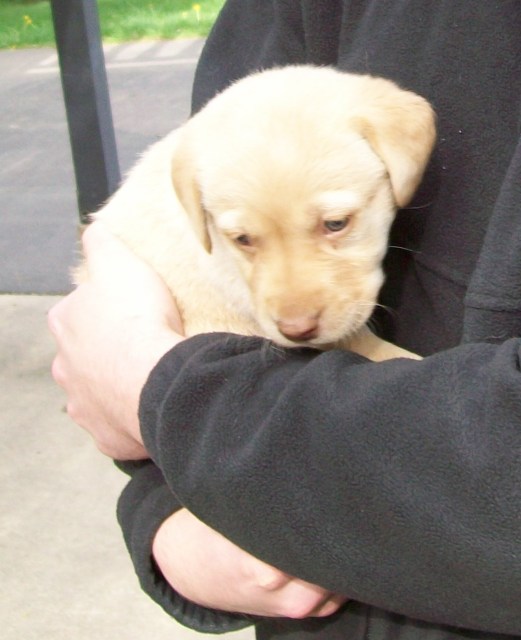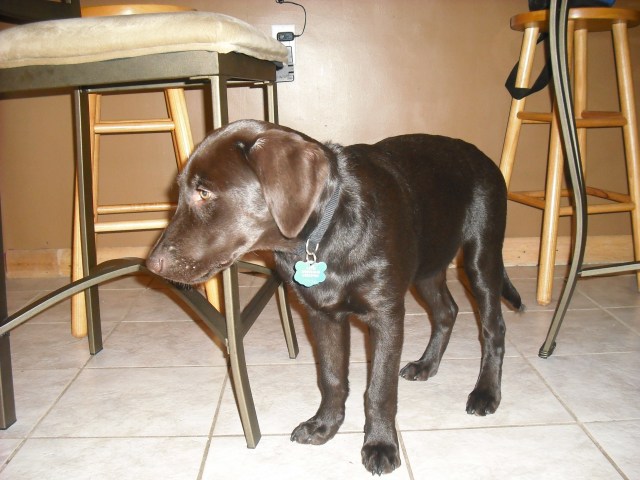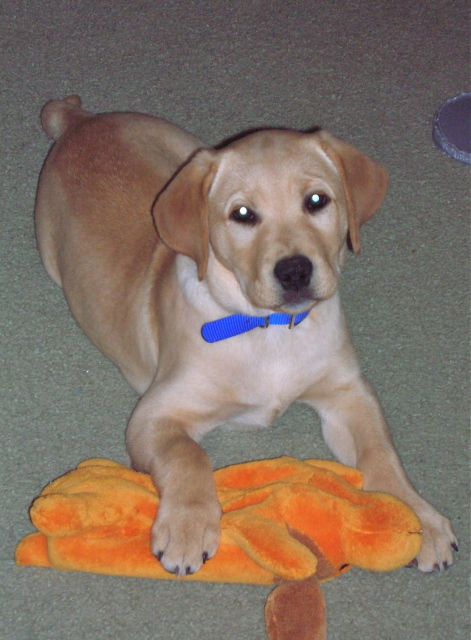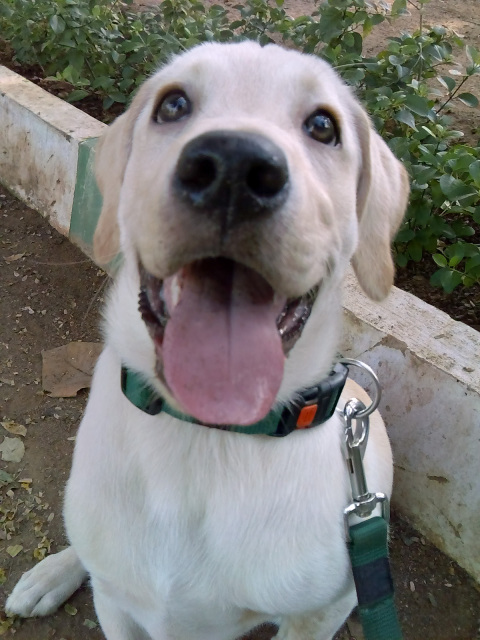QuestionHello.
We got a yellow male lab/chesapeake mix puppy at 10 weeks old. His name is Winston. He is now about 3 months old. I have not had a puppy since I was a kid, and now I have 2 children, so I know I am no expert. I have read, asked friends, and my vet about housetraining, using a crate, chewing, biting...and have some success training him, but I am concerned about how aggressive he is.
I am home with him all day. He generally gets a morning walk with my husband, and I try to take him jogging later on. When the kids get home, he gets more walks. Several times I have taken him to play with other dogs so he can get some doggy socialization. He has got to play in the sprinklers and does things that I think I would enjoy if I were a dog.
I work at home, and when I get busy, and he is chewing on things, he goes out in the back yard. I can no longer leave him loose because he digs in my flowerbeds so he is tethered. He does get to run loose, but not unless someone can watch him. Sometimes he is out there a few hours, but I peakk on him to make sure he is OK. He is usually just napping in the shade. He still digs up the grass, but I guess that is easier to deal with. I realize he is teething. He gets ice, lots of chew toys, rawhide bones and other toys to chew on, inside and out. I have a spray bottle with lemon and water in it that used to stop him when he got out of control, but now if I spray him, he just gets mad, barks and tries to bite me. He has been to see our vet and I want to get him fixed as soon as he is old enough because I am hoping that will help mellow him out.
He can be gentle and sweet, but has spells of craziness that I would consider more than chewing or mere biting. He lunges after me and acts angry and I have to try and restrain him to keep him away. He especially bites my 8 year old son and that is my biggest concern.
I need some advice. I have no problem working with him, and I know these things take time. I don't want the family to get attacked and hurt. Could he be mad at me? Could he be sick? He had some diarrhea today.
He can be such a good puppy. He is sometimes just silly, but then turns on us.
Any suggestions?
Karen
AnswerThe aggression and biting calls for stronger corrections than the
otherwise effective "Bad dog!". When it misbehaves, throw it on its back, and
growl "Bad dog!" right in its face. Hold it down until it lifts one back leg
to show submission. You can pick him up with your hands behind his front
shoulders and hold him up with his back to you. Keeping him far enough away
to keep his head from smashing into your face, hold him until he stops
struggling and relaxes. Or continue the squirt bottle. Fill it with water
and a little vinegar or lemon juice. Give it a squirt in the face as soon as
it misbehaves. Dogs hate that.
Start obedience training. A good obedience class or book is about you being top dog, not about rewarding standard commands with a treat. Start obedience training the day you get the dog. Build on the foundation of housebreaking. The younger the puppy, the shorter you must keep sessions, only a few repetitions at a time. A few minutes here and there, and before long, people will be impressed with what a nice dog it is.
It may be better not to jog with him. It puts too much stress on his developing joints. Fat puppies are another threat to their joints. For a guide to his ideal weight, see http://www.puppychow.com/products/popup_body_condition.aspx
The pet stores are full of toys that many dogs will quickly chew up into
pieces they could choke on or cause intestinal blockages. If you are not
there to watch, stick to sturdy stuff such as Nylabones and Kongs. Keep a
close eye on chew toys and quickly discard anything that is coming apart in
pieces. Rawhide is especially bad because it swells after being swallowed.
These problems are the worst with, but not limited to, large, aggressive
chewers such as Labs.
Ropes from the pets' store quickly turn to hazardous shreds. Ones I made
lasted much better. Go to a hardware or home center that sells rope by the
foot. Buy 2' of 3/4" poly rope. Melt the ends, and tie knots in it. Get
them as tight as possible, put it in a vise and pound it with a hammer. Watch
carefully, and be ready to discard when it comes apart.
Here are some exercises that will help establish your higher status:
''Elevation for small puppies: Sit on the floor and gently put your hands around your pup's middle, below his front legs, and lift him up. He is facing you. Hold him for 15 seconds. Repeat until he no longer struggles. If he is past 10-12 weeks, lift his front feet off the ground, but don't pick him up.
Cradling for small puppies: Hold your puppy gently on his back, as you would cradle a small baby. If he struggles, hold him firmly until he quiets for 10-15 seconds. With larger pups, you can do this as your sit on the floor, with your pup between your legs.
Quiet lying down: Place your pup on the floor on his side, with all 4 legs pointing away from you. Use your hands on his neck/shoulder area and middle, to hold him in this position. When he is quiet, praise him. Lengthen the time that you keep him quietly in this position. When he accepts this position well, handle his paws and muzzle, while keeping him quiet.''
The quotes mean this isn't my original work. It is copied from my Puppy Raising Manual. I have long used these or minor variations of them, and they are very effective. You may want to give him a belly rub while he is on his back too. Helps bonding. There is a big difference between him rolling over and demanding a belly rub, and you choosing a time to roll him over and rub his belly. The latter cements your place as pack leader.

 Lab Puppy Eye Color
Question
Yellow Puppy
We are looking at buying a 5 1/2
Lab Puppy Eye Color
Question
Yellow Puppy
We are looking at buying a 5 1/2
 Lab eating my house! (and everything else)
Question
Pepper
I have a sweet sweet black female lab t
Lab eating my house! (and everything else)
Question
Pepper
I have a sweet sweet black female lab t
 is my lab too small
Question
Reese
I have a 19 week old Male chocolate lab.
is my lab too small
Question
Reese
I have a 19 week old Male chocolate lab.
 constant puppy barking
Question
My 13 week old female yellow lab barks consta
constant puppy barking
Question
My 13 week old female yellow lab barks consta
 Hyper active Labrador Pupp.
Question
Benji
Hello Jen,
&nbs
Hyper active Labrador Pupp.
Question
Benji
Hello Jen,
&nbs